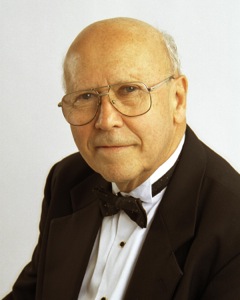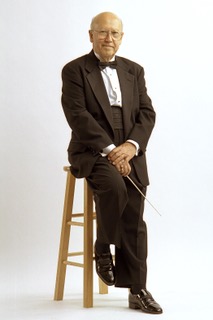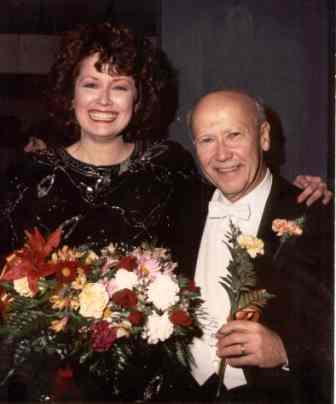Remembering Paul Vermel

Paul Vermel, legendary conductor, educator, mentor, and orchestra builder, passed away on February 14, just five days before his 100th birthday. He was a professor of music at the University of Illinois and music director and conductor of both the University Symphony and Champaign-Urbana Symphony Orchestra (CUSO) from 1974 to 1994. The CUSO will perform a concert in his honor to close out its season on Saturday, April 20. The program will feature music Vermel conducted with the orchestra, including Alexander Arutiunian’s Trumpet Concerto with soloist John Hagstrom of the Chicago Symphony Orchestra. Read on to learn more about Maestro Vermel and to read remembrances from longstanding members of the CUSO and current music director and conductor Stephen Alltop.
Paul Vermel was born in Paris, France, on February 19, 1924, shortly after his family had emigrated from Russia after the Russian Revolution. In search of safety during World War II, Vermel’s family left Paris and spent a year in the seaside town of Deauville on the Normandy coast, then fled to the “free” area of Vichy until all of France was under German occupation. They eventually returned to Paris, where it was easier to hide from German soldiers. Vermel grew up playing piano with his father, but he realized his destiny was conducting at the age of 13 when his parents took him to see the Royal Concertgebouw Orchestra. As a young man in Paris, he studied organ, conducting, harmony, and theory, before moving to the United States in 1949 to attend the Julliard School.
In New York, Vermel served on the faculty at Julliard in the orchestra and opera departments, taught at Brooklyn College, and conducted numerous local orchestras. He made his Broadway debut in 1954 as assistant conductor of Gian Carlo Menotti’s Saint of Bleecker Street. After a few years in California leading the Fresno Philharmonic and teaching at California State University, he moved to Maine in 1966 to head the Music in Maine Project (a Title III educational program). The following year, he was tapped to lead the Portland Symphony Orchestra as the ensemble’s first full-time conductor. He steered the ensemble through an extensive period of musical growth, transforming it into a fully professional orchestra and establishing the Portland String Quartet, now in its 55th season.

Vermel’s next port of call was Champaign-Urbana, where he served as a professor of music at the University of Illinois and music director and conductor of the University of Illinois Symphony and the Champaign-Urbana Symphony Orchestra (CUSO) from 1974 to 1994. While at the University, he conducted numerous operas with Illinois Opera Theater and took the University Symphony on tour throughout the state.
Vermel left a lasting legacy on the CUSO during his 20-year tenure with the orchestra. “Paul Vermel helped establish a culture of excellence that is such a hallmark of the Champaign-Urbana Symphony Orchestra to this day,” current CUSO music director and conductor Stephen Alltop explained. “He also furthered the tradition of presenting both great works and soloists.”
A passionate educator, Vermel was a frequent All-State and District Festival conductor. He also led the Aspen Music Festival’s orchestral conducting program for 14 years and taught at the Conductor’s Institute at the University of South Carolina for 26 years. His students have achieved success on podiums across the United States and Europe.
Alltop is one such student. “It was my good fortune to study with Paul Vermel as a Conducting Fellow at the Aspen Music Festival where he taught for many years,” he said. “Those nine weeks were extremely influential and important to me and my development. Maestro Vermel shared so much knowledge about the repertoire, which as a then 24-year-old conductor I was eager to receive. I retain a special fondness for the scores I studied and conducted that summer. Occasionally, I’ll still find strips of paper with his notes in them! When I read these notes, I cannot help but hear his notable French accent!”
Vermel retired from the university in 1994 and moved to the Chicago area with his wife, Carolyn Paulin, where he continued to conduct and teach privately before moving to Scarborough, Maine, in 2014. Vermel made his final podium appearance in 2015 at the Portland Symphony Orchestra’s 90th anniversary concert, conducting Beethoven’s Egmont Overture from memory.
Over the course of his six-decade career, Vermel guest conducted countless national and regional orchestras, including the Pittsburgh Symphony Orchestra, Baltimore Symphony Orchestra, National Symphony Orchestra of Washington, DC, Rhode Island Philharmonic Orchestra, New Jersey Symphony, and L’Orchestre Symphonique de Québec. He also has a number of prestigious awards to his name, including the Koussevitzky Memorial Award at Tanglewood, the American Symphony Orchestra League Recognition Award, and the ASCAP Award for adventurous programming of contemporary music. In 2009, he received the Max Rudolf Award from the Conductors Guild in recognition of his outstanding achievement and contributions to the field as a conductor, pedagogue, scholar, and ensemble-builder. The Northwest Symphony Orchestra also established the Paul Vermel Conductor Apprenticeship Program to support the next generation of conductors and the Paul Vermel Young Artist Award, a competition for high school-aged musicians to perform solo with an orchestra.
To honor Vermel’s life and legacy, the CUSO will present Fanfares Finale—A Memorial Tribute to Paul Vermel on Saturday, April 20, at the Krannert Center for the Performing Arts. “This concert begins with Brahms’ Variations on a Theme of Haydn and concludes with Hindemith’s Symphonic Metamorphosis on Themes of Carl Maria von Weber,” Alltop explained. “Not only are these works Maestro Vermel conducted with CUSO, they offer four composers for the price of two! The Trumpet Concerto by Arutuinian is another work performed by CUSO with Vermel, and features my good friend from Eastman School days and longtime Chicago Symphony Orchestra member, John Hagstrom. The world premiere of Terry Everson’s Festival Fanfare continues CUSO’s commitment to new music and young musicians in our community. I Crisantemi is a beautiful memorial piece that Puccini composed in one night after learning of the death of his friend, the Duke of Savoy. We will perform it as a memorial to our mentor and friend, Paul Vermel.”
Now, we turn it over to the longstanding members of the CUSO for their personal remembrances of Maestro Vermel.
Vermel was a serious, focused, demanding conductor, just as a conductor should be. But he must have had a sly sense of humor, as he proved to me some years ago during a rehearsal break. He saw me backstage, and he said, with a twinkle in his eye: “By the way, your parents say hello.”
I suspect my mouth fell open. Vermel knows my parents? My mother and father had been living in Fresno, California, since 1970. No connection to central Illinois. And their last name was Avakian, no connection to the only name Vermel has known me by. Meanwhile, he was enjoying my obvious confusion, just what he had calculated.
At last he told me he had just returned from guest-conducting the Fresno Philharmonic, an orchestra he once led. Things began to fall into place. My parents attended the concert. They read Vermel’s biography in their program. They saw he was the music director of the Champaign-Urbana Symphony Orchestra. They remembered that I play in the CUSO, and furthermore, they read that Vermel was Armenian. At least his mother was Armenian.
Knowing my parents’ keen interest in meeting other people of Armenian heritage, I knew just what had happened: they had gone backstage after the concert, shook Vermel’s hand, identified themselves, and mentioned me—thus giving Vermel the chance to prove he could be a funny man too.
— Armine Mortimer, first violin
Soon after Paul Vermel became the conductor of the CUSO, there was a vacancy in the flute section. I auditioned and was chosen for the piccolo position beginning in the 1975–76 season. I did not yet own a piccolo, so this was my opportunity to purchase an instrument. Piccolos vary in tone color, and not feeling sure of the best sound for the orchestra, I reached out to Maestro Vermel. Much to my surprise, instead of going to his office with multiple instruments, he offered to come to my teaching studio where he listened to the instruments and gave me his preference for the best piccolo sound. I appreciated his attention to detail and consideration and respect for the Symphony members. Thanks to Paul Vermel for leading the CUSO for 20 years with dedication and a clear vision for progress.
—Ellen Elrick, piccolo/flute 3
Maestro Paul Vermel led the Champaign-Urbana Symphony Orchestra for 20 years. It was a pleasure to play second oboe in the CUSO under his leadership, especially the French orchestral music that he loved. Paul Vermel fostered trust and understanding between the CUSO Board of Directors and musicians. In the mid-1990s, the CUSO faced financial and other challenges. Even after his retirement, Maestro Vermel advocated for the future of the CUSO and helped us to avoid a merger with another orchestra and retain our independence. His advocacy helped to ensure the survival of the CUSO and our continued contributions to the Champaign-Urbana community.
—Margaret (Peggy) Grossman, oboe
Maestro Paul Vermel was a treasure, inspiration, and blessing to the Champaign-Urbana Symphony, University School of Music, and C-U community. He will be greatly missed, but not forgotten. My eternal gratitude goes to him for inviting me to play as Principal Cello in the Champaign Urbana Symphony starting in March 1984, and for his unwavering artistic support in many ways over the years. When Maestro Vermel became Music Director of the NW Symphony after leaving C-U, one way to thank him was by founding the Paul Vermel Young Artist's Competition and Scholarship.
Ronald, who sang as soloist in numerous Champaign Urbana Symphony Oratorio and Requiem performances under Paul's direction, felt he was a perfect singer's accompanist and colleague both on and off the podium. Paul's photo and various CUSO posters remain on our studio wall to this day. Paul, Carolyn, Ronald and I remained friends since they moved from Central Illinois. We send warm, heartfelt condolences to his wife Carolyn Paulin and family. Rest in peace, Cher Maestro Vermel!
—Barbara Hedlund, principal cello, and Ronald Hedlund, baritone

After "Don Quixote," Nov. 15, 1991. Barbara Hedlund, Soloist, and Maestro Paul Vermel.



